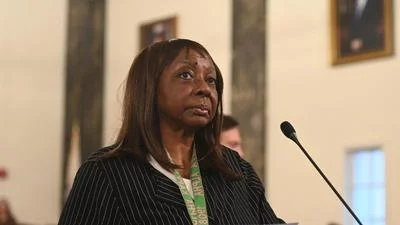Jurors, who began deliberating Thursday, have the option of finding Van Dyke, 40, guilty of the lesser charge of second-degree murder.
Jurors, who began deliberating Thursday, have the option of finding Van Dyke, 40, guilty of the lesser charge of second-degree murder.
Jurors who are now deciding the fate of Chicago police officer Jason Van Dyke heard key testimony on the mental state of the teen, high on PCP, who refused commands to drop a knife before being fatally shot.
Chicago police officer Jason Van Dyke has been on trial for the 2014 shooting death of 17-year-old Laquan McDonald. Van Dyke, who is white, was charged with two counts of first-degree murder in the shooting death of the black teenager.
One of the key moments in Van Dyke’s defense came from the testimony of a pharmacology expert about McDonald’s autopsy results showing the presence of the hallucinogenic drug, phencyclidine, or PCP, in his system. Van Dyke’s attorney, Daniel Herbert, quoted the expert’s testimony about “rage, aggression, violent behavior,” according to a report of the trial by the Chicago Tribune.

Police Officer Jason Van Dyke: Jury deciding his fate.
“Yes, Van Dyke did not know McDonald was on PCP that night,” the Tribune quoted Herbert as saying. “But that didn’t mean he didn’t recognize McDonald was ‘whacked’ out of his mind," he said.
"Those symptoms of rage, aggression, violent behavior, drug-induced psychosis, that describes Laquan McDonald. Yeah, Jason Van Dyke recognized that. Did that play a factor in his decision to shoot? Absolutely.”
Van Dyke himself testified at the trial that, "His (McDonald’s) face had no expression, his eyes were just bugging out of his head. He had these huge white eyes just staring right through me.”
The description of the symptoms of an individual on PCP are supported by drug recognition expert Keith Graves, a retired police sergeant from the San Francisco Bay area who now operates Graves and Associates of Idaho, a training firm for police, business and schools.
“PCP is a dissociative anesthetic,” Graves told Chicago City Wire. “It was first developed in the 1960s for performing surgery while patients are still awake. It was dropped when they realized how dangerous the side effects are.”
Graves said that an individual on PCP can’t process thoughts in a normal way.
“Someone on PCP typically can’t respond to an officer who orders them to stop whatever it is their doing,” he said. “The command doesn’t register with them.”
McDonald had refused police commands to drop a knife.
Graves also said that anyone on PCP is prone to irrational thoughts and violent outbursts.
“We had a case back in the '90s where an unemployed guy on PCP walked by a construction site and thought if he starting breaking things they would have to hire him to fix it,” he said. “It took a full construction crew to hold him down before we got there.”
Graves said that ultimately the jury will decide, but the fact that McDonald was on PCP meant that “he was dictating events that night.”
Jurors, who began deliberating Thursday, have the option of finding Van Dyke, 40, guilty of the lesser charge of second-degree murder.






 Alerts Sign-up
Alerts Sign-up